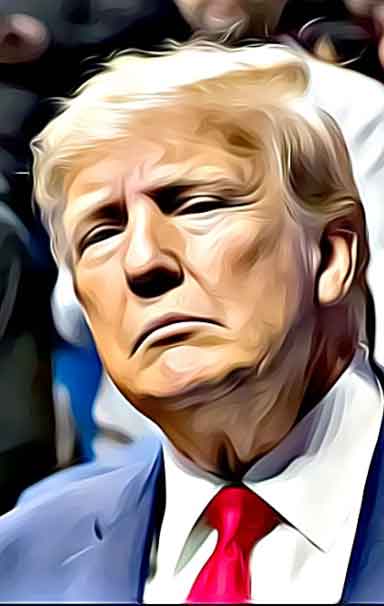
Tuesday night's Republican debate was the first one from which no clear winner emerged in the media post-game. To be clear, pundits are often incorrect about who is going to benefit in the polls. But Tuesday night, few people even ventured an opinion.
My opinion is that the only clear winner was moderator Hugh Hewitt, who stared down Trump with icy disdain when the front- runner tried to use his normal schoolyard bullying tactics. The utter failure of his only debating technique rattled the man so badly that he turned around and lashed out at Jeb Bush; poor debate skills and weak poll numbers made him an easy target.
But that doesn't mean that Trump won't eventually emerge the winner from this debate anyway. Sure, he may not be able to describe what the nuclear triad is, articulate a workable plan for containing Islamic State, or formulate a cyber-strategy that doesn't rely on conjuring up some wizards from a 1990s-era hacker film, prepared to "penetrate the Internet and find out exactly where ISIS is and everything about ISIS" with a few dramatic keystrokes. But strong, well-grounded policy is obviously not what appeals to people about Trump. People like him because he cocks a snook at an establishment they think has too much power.
What's interesting about Trump's rise is that it reveals how little power that establishment actually has. Trump is not somehow taking power away from a self-satisfied elite. But he is revealing that the elite never had the kind of dominance that populists like to imagine.
Consider the two great villains of the populist mind. The left thinks that politics is controlled by the vast fortunes spent on elections by corporations and right-wing billionaires. The right thinks that similar influence is exerted by liberal media and economic elites. Trump's poll numbers belie both theories.
But isn't Trump a billionaire, you will ask. Ah, but Trump is spending very little money on this campaign. The reason he's doing so well is that he's getting a ton of media coverage. While other candidates have to spend money to hire staffers and air ads to get their message out, Trump merely says something outrageous and waits for the media to swoop down and give him eons of free air time.
The other billionaires, meanwhile, hate him. Virtually everyone in the professional Republican establishment hates him -- not because he's just too darn serious about immigration, but because they would, not unreasonably, like their party to nominate a candidate with some chance of winning the general election.
Yet the establishment, and the billionaires, with all their money, can't seem to do a darned thing to stop Trump. So much for money buying elections. Media matters much more than money.
And yet, the media is also curiously powerless here. If the news media actually operated like the tacit conspiracy that many conservatives imagine, we would have all quietly gotten together and agreed to bury Trump. He could rant in the privacy of his own home, as reporters graciously declined to broadcast his latest pronouncements. Instead, every time he says something, everyone in the media rushes to condemn, fact-check, analyze, highlight, mutilate, fold and spindle it. All this media outrage, of course, only improves his ratings with people who believe in the conspiracy.
Why does this happen? It's a collective action problem. If other people are reporting on Trump, then he's news, which means you have to report on him too. Witness the fact that I am writing something like my sixth or seventh column on a man who I still don't think will be the Republican nominee, much less the president of the United States.
It's obvious that media moguls didn't meet in a smoky back room to silence coverage of Trump. But there's a slightly more plausible theory: That the Hillary Clinton supporters among the news media see Trump's nomination as the best thing that could possibly happen for the Democratic Party. Unless the Grand Old Party nominated the disinterred corpse of Richard Nixon, there's probably no surer path to Clinton's victory.
Trump consistently underperforms folks like Marco Rubio in head-to-head matchups against Democratic candidates. As a nominee he would motivate massive turnout among Latinos who want to vote against him. And the party operation he'll need to actually get supporters to the polls in November 2016 is not going to rally behind him with any great enthusiasm even if he somehow manages to secure the nomination. Trump supporters should be absolutely clear on this point: A vote for Trump in the primary is a vote for Clinton in the general.
It's a slightly more plausible theory, but let's get real: Journalists are covering Trump because he's newsworthy. It's an unintended side effect that coverage of Trump helps Clinton.
There's the great irony in Trump's rise. Trump supporters think they're striking a blow against the liberal establishment. In fact they're nudging it more firmly into place.
Previously:
• 10/28/15: Preschool Helps Kids. Sometimes. Briefly.
• 10/26/15: If you like truth, don't watch the movie 'Truth'
• 10/21/15: Turns out timeless cliches and the Beatles understood the 2016 election season before the rest of us did
• 02/09/15: Reading the tea leaves for 2016 gets you nowhere
• 02/02/15: Hillary's late start won't stop punches
Comment by clicking here.
Megan McArdle is a Bloomberg View columnist who writes on economics, business and public policy. She is the author of "The Up Side of Down." McArdle previously wrote for Newsweek-the Daily Beast, the Atlantic and the Economist.



 Contact The Editor
Contact The Editor
 Articles By This Author
Articles By This Author